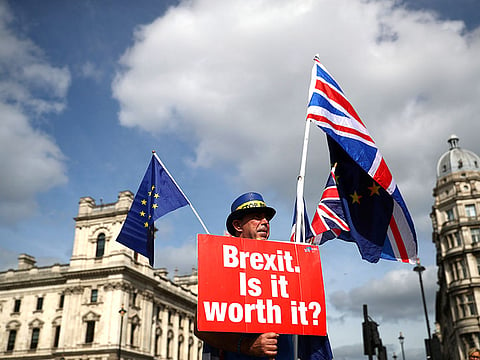It’s crunch time for Britain and Brexit
With so much to do in so little time, there are fears that civil disorder might break out in the UK

Madrid: While the United Kingdom is to leave the European Union on March 29, the reality is that the deadline for reaching a deal on Brexit is far sooner. Why? Simply because any deal must be passed by the UK parliament, the other 27 EU nations, and by the European Parliament and European Commission.
With so many having a say, there’s little wriggle room.
The EU had planned to have the Brexit deal signed off at an October 18 summit. But the schedule of meetings does allow for a special summit in November — and the date of November 13 is being floated as a final chance to agree a final deal.
Even then, if all sides agree on the substantive issues, Prime Minister Theresa May must get her divided government, party and parliament to support any deal. And right now, with each passing day, that’s becoming less and less likely.
EU chief negotiator Michel Barnier has warned that two key elements of the UK’s proposed Brexit deal — the “Chequers plan” — are dead. He told UK parliamentarians on Friday Brussels would not accept London’s proposals for customs arrangements and a common EU-UK rule book on goods to ease trade after Britain leaves.
He said the terms of divorce are 80 per cent agreed, but warned it is at risk by a failure to strike a deal on the border between Ireland and Britain’s Northern Ireland.
Both sides have vowed to avoid the re-imposition of border checks, which could threaten the fragile peace in the region, but disagree on how this could be achieved.
The EU proposes Northern Ireland should stay aligned with the EU — something London says would split its territory.
The Chequers plan is also bitterly opposed by hardline Brexiteers within May’s ruling Conservative Party. Writing in the Mail on Sunday, former Foreign Secretary Boris Johnson described any border deal with Ireland “like a suicide vest” — an analogy that brought furious condemnation.
As part of its preparations for no deal, London issued 84 papers outlining what will happen then.
“Under a no-deal scenario, chemicals, food and drink, clothing, manufacturing, cars and retails were sectors to be most affected negatively,” Britain’s Chancellor of the Exchequer, Phillip Hammond said, adding GDP would take an immediate 7.7 per cent hit and take 15 years to recover.
Sajid Javid, the UK’s Home Secretary, refused to rule out the possibility that a no-deal Brexit could cause widespread protests and weeks of civil disorder.
Contingency plans for a no-deal departure drawn up by police chiefs say shortages of medicine could “feed civil disorder”, while more general price rises could prompt “widespread protest which could then escalate into disorder”.
— With inputs from agencies
Sign up for the Daily Briefing
Get the latest news and updates straight to your inbox



